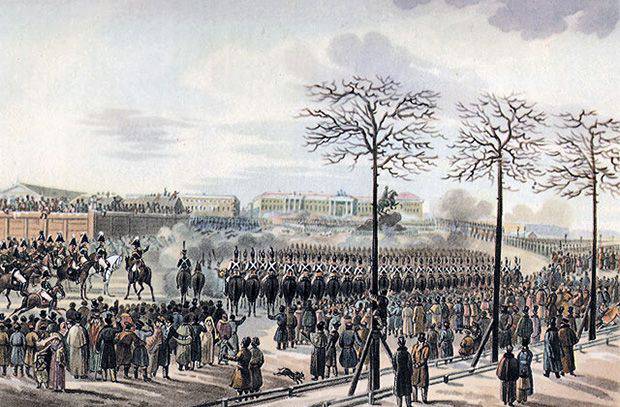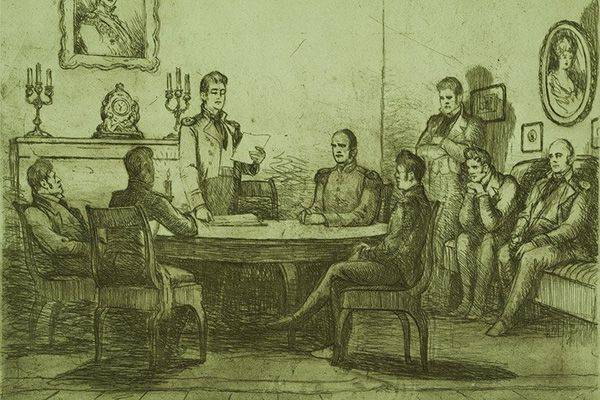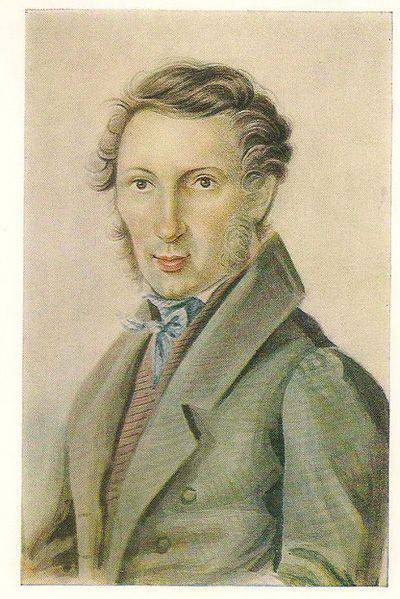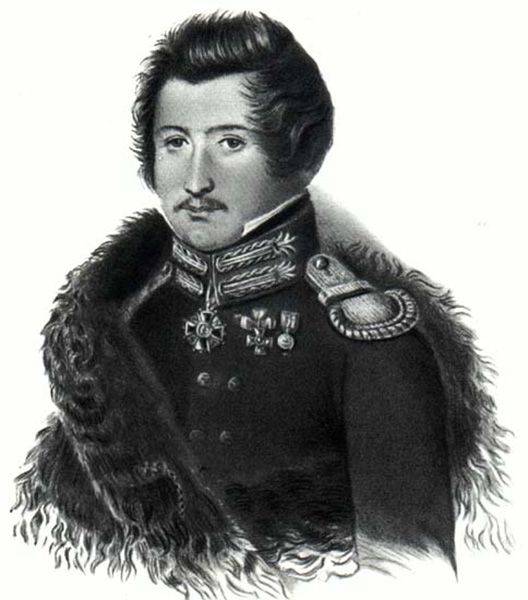Alarm clock for Herzen

The first Russian revolutionaries came up with a new Russia, but failed to defend their dream
The first quarter of the XIX century was the heyday of secret political societies in Russia. Our country did not yet know such organizations: unlike the Masonic lodges, they set goals for themselves with the reorganization of the state, and not with the correction of morals. The uprising of the Decembrists, which happened in the 1825 year, could well have been possible, if not for the indecision of their leaders.
From France with ideas
The ideology of such societies was fed from various sources. First of all, dissatisfaction with the liberal-minded part of the nobility with the policies of Alexander I contributed to their formation: the tsar was expected to solve the most serious problems related to the backwardness of the country, and especially the problems of serfdom. Instead, government policy after World War 1812, the year sank into reaction. Many of the officers, who until this time were in the masonic lodges, began to become disillusioned with the possibility of a peaceful reorganization of society.
Another source of discontent was the comparison between Russia and the West that future Decembrists made during the hostilities in Europe. “Returning to St. Petersburg, could our liberals be satisfied with a vulgar regimental life and boring petty activities and details of military service, which their bosses strictly demanded from them, catering to Alexander’s innate tendency for brothers and men to frustration, solo exercises, etc., despite It seems that the experience of a two-year cruel war with the enemy by the most skillful could convince Alexander that victory does not depend on these trifles, ”the Decembrist Mikhail Fonvizin later writes.
Comparison with Europe turned out to be not in favor of Russia, and many of the future conspirators felt keenly this in the first days of their return to their homeland - for example, the young warrant officer of the Semenov regiment Ivan Yakushkin was struck by the scene when the police began to beat people who met the winners, returning to St. Petersburg with regiments: “During the prayers, the police mercilessly beat the people who were trying to get close to the army built up. This made us the first unfavorable impression upon returning to the fatherland. ” Further Yakushkin writes: “Finally, the emperor appeared, leading the guards division, on a glorious red horse, with a bare sword, which he was ready to lower before the empress. We admired them; but at this very moment, almost before his horse, a man ran across the street. The emperor gave the spurs of his horse and rushed at the runner with a bare sword. The police took the guy in the stick. We did not believe our own eyes and turned away, ashamed of our beloved king. It was my first disappointment about him. ”
Finally, the spread of revolutionary sentiment in Europe itself played a significant role. The officers were most receptive to political ideas. “Being during a campaign abroad,” the same Yakushkin would say during interrogation in the case of the Decembrists, “probably, for the first time, my attention turned to the social structure in Russia and made him see shortcomings. Upon my return from abroad, the serfdom of the people was presented to me as the only obstacle to the convergence of all classes and with it public education in Russia. ”
Thoughts and plans
The first secret political societies began to appear in Russia in 1814. It is curious that the king knew from denunciations about their existence - he even knew the names of their members. However, Alexander did not resort to repression, apparently, not considering them dangerous. In 1815, he, however, banned the activities of the so-called Semenov Artel, created by officers of the Life Guards Semenovsky Regiment, among which were Sergei Trubetskoy, Sergei Muravyev-Apostol and Dmitry Yakushkin.
In February 1816, the Union of Salvation was created in St. Petersburg. The structure of the society included almost 30 people, among whom were Alexander Muravyov, brothers Muravyov-Apostles, Prince Sergei Trubetskoy, Ivan Yakushkin and Pavel Pestel. The union considered as its objectives the tasks that once faced the Tacit Committee: the destruction of serfdom and autocracy. It was not clear, however, the form of restriction of autocracy, as well as the specific strategy of struggle. Members of the Union of Salvation argued a great deal about these issues, drawing on examples from French political clubs, the secret unions of the Italian Carbonari and the Prussian patriotic society Tugendbund. They had their own hotheads in the organization - the same Ivan Yakushkin, excited by rumors that Alexander I was supposedly going to transfer the capital to Warsaw, away from the rebellious nobility, was called to kill the king. However, on the whole, a peaceful, gradual strategy prevailed in society - the “Union of Salvation” was going to act by persuasion, attracting to its side the most prominent officials surrounded by the emperor.

The company's charter was strict: it was to be governed by “boyars” who demanded absolute obedience, and provided for penalties for divulging secrets. This statute caused rejection among some of the Decembrists - they did not like its authoritarianism, and also the fact that this statute did not allow the creation of a wider society. This was one of the reasons why it was decided to dissolve the previous society and create a new one. It originated in 1818 year under the name "Union of Welfare". It consisted of about 200 people, it was governed by the Moscow Indigenous Government, which had local governments in provincial cities. The Union of Welfare was a semi-legal organization — the official goal was proclaimed moral education and enlightenment of the people, helping the government and softening the plight of the serfs. Only members of the Indigenous Government knew about the secret goals inherited from the Union of Salvation. The new organization used to promote literary and educational societies (such as the Green Lamp and the Free Society of Lovers of Russian Literature), a number of magazines and brochures. The society set itself a task that seemed quite realistic: in the next 20 years to conduct an almost bloodless coup with the help of the guards units.
However, like the previous society, the Union of Welfare from the very beginning was not distinguished by the unity of positions. Disagreements between radical and moderate members of society, as well as the need to get rid of random people, led to the dissolution of society in January 1821. Two others arose in its place: the Southern Society in Ukraine, headed by Pavel Pestel, and the St. Petersburg Northern Society, created on the initiative of Nikita Muravyov. These societies interacted with each other and viewed themselves as part of the same organization. They did not agree only in their vision of the future Russia. Thus, in the program of the Southern Society, called "Russian Truth", it was planned to replace autocracy with a unitary republic on the model of Novgorod, but built on the separation of powers. Southern society planned to free the peasants from serfdom with the allotment of land. And in the "Constitution" - the program of the Northern society - it was decided to establish a constitutional monarchy, while turning Russia into a federal state. Peasants Northern society was going to free without land.
Price indecision
The lack of a unified program was not an obstacle to the preparation of the uprising, which was planned for the summer of 1826. However, in November 1925, an event happened that accelerated the conspirators' plans, the emperor passed away. After the eldest of Alexander's brothers, Konstantin, showed an unwillingness to take the throne, the right of inheritance passed to Nicholas, who was extremely unpopular with the guard. The conspirators were ready to swear allegiance to Constantine and even formally dissolve their societies if the heir, known for his liberal views, ascended the throne. But they didn’t want to swear allegiance to Nicholas, realizing that they would hardly have any chance of coming to power with this emperor.
On December 14, 1825 of the year was appointed to “swear” the new emperor. At the meeting with Ryleev, members of the Northern Society decided to use dubious legitimacy (after all, there was no definite refusal of Constantine from the throne) as an excuse for an uprising: they agreed to act on this day to prevent the troops and the Senate from taking the oath to the new tsar. The uprising was to be led by the "dictator" Prince Sergei Trubetskoy and the "Chief of Staff" Yevgeny Obolensky. It was planned to occupy the Winter Palace and the Peter and Paul Fortress, arresting the royal family, and publish on behalf of the Senate the “Manifesto to the Russian people”, which would proclaim a change in the form of government in the state and the establishment of the Provisional Revolutionary Government. Such a manifesto would give legitimacy to the coup.

The manifesto provided for the abolition of serfdom, recruitment, military settlements, corporal punishment, poll tax and tax arrears, the introduction of democratic freedoms (words, occupations, religions), equations in the rights of all classes, election of central and local authorities, etc. All this was supposed to consolidate the first stories Russian constitution. Since the members of the two societies did not have unity on the question of a specific form of government, it was planned to convene a National Council, which would decide whether to build a republic or a constitutional monarchy.
The conspirators were well aware of the irrevocability of their decision - as Ryleev said on the eve of the uprising, “the scabbard is broken and the sabers cannot be hidden”. On the morning of December 14, the conspirators were in full agitation against the oath to Nicholas in their military units. Alexander and Mikhail Bestuzhev, as well as Dmitry Schepin-Rostovsky, brought 11 soldiers of the Moscow Guards regiment to Senatskaya Square to 800, having built them in a square near the monument to Peter I. In the afternoon, sailors of the Guards crew and soldiers Guard Grenadier Regiment. In total, about 3 thousands of soldiers and sailors and 30 officers gathered in the square, not all of whom, by the way, were in secret society - some were convinced by the skillful agitation of the conspirators. However, there was no visible “dictator” Trubetskoy on the square - there was no one to give a signal about the beginning of the uprising. The prince did not dare to lead the rebellion, not believing in his success. In addition, Alexander Yakubovich, who was scheduled to seize the Winter Palace, arresting the royal family, suddenly refused the assignment, fearing that he would have to resort to regicide.
Nicholas was aware of the plans of the conspirators and, although he was extremely frightened by the rebellion, he decided to speed up his accession to the throne - without waiting for the ceremony, he took the Senate oath at dawn, at 7 in the morning. The passivity of the rebel troops played its sad role - so, they did not even try to capture those few light guns, which the troops loyal to the king brought to the square for shelling. Nikolai did not want bloodshed and sent for negotiations to the rebels the governor-general of St. Petersburg, the hero of World War 1812, Mikhail Miloradovich, who had enormous prestige among the soldiers. Justly fearing that Miloradovich will be able to persuade the rebels to lay down weapon, Peter Kakhovsky shot at the Governor-General with a pistol, mortally wounding him. However, time was lost: Nikolay managed to pull a detachment of infantry into 9 thousand men and 3 thousandth cavalry to Senate Square.
The army units did not want to kill each other: the cavalry twice launched an offensive, but the rebels stopped him with guns firing into the air. Nikolay, seeing that many of his officers frankly sympathize with the rebels, gave the order to use artillery, which began to beat the rebel with grape-shot. Began flight. By 6 hours of the evening the uprising was completely suppressed. The night was spent gathering the bodies of the dead and washing the blood off the stones from the square. In the evening, the defeated Decembrists at Ryleyev gathered to say goodbye and agree on how to behave during interrogations. After that, some of them went straight to the Winter Palace - to surrender.
Deaf Echo
Two weeks later, on December 29, a riot broke out in the south - Sergei Muravyov-Apostol raised the Chernihiv regiment, located near Kiev. The Southern Society was pushed to the uprising by the news of the unsuccessful demonstration in St. Petersburg and the arrests of conspirators who did not take part in it. However, Sergei Muravyov-Apostol and Mikhail Bestuzhev-Ryumin tried in vain to convince the soldiers that the autocracy had outlived its own by spreading the Catechism drawn up in advance. Having isolated the Chernigov regiment, government troops, in command of which the emperor, by the way, entrusted his elder brother Konstantin, shot the regiment with a canister, and Muravyov-Apostol himself in shackles was taken to St. Petersburg.

In the case of the Decembrists, 579 people were brought in, of whom more than half were found guilty - 289. Nikolay personally took part in the interrogations. The investigation was conducted for six months. It is curious that Count Speransky and Admiral Mordvinov, whom the Decembrists planned to enter into the Provisional Government, took part in the trial of them. The death sentence, however, was imposed on only five - Ryleev, Pestel, Kakhovsky, Bestuzhev-Ryumin and Sergey Muraviev-Apostol. They were first sentenced to quartering, but then they replaced this medieval execution with a more humane one - by hanging. True, the Decembrists themselves still perceived it as shameful - at the sight of the gallows, Pestel said: “Can it be that we do not deserve a better death? It seems that we never averted our heads either from bullets or from nuclei. We could have shot us. ” Nikolay himself did not fail to write to the prisoners in a letter to his mother in the end: “The naughty people behaved in a vile manner, without any dignity.”
More than 120 people were exiled to Siberia for penal servitude or settlement for various periods by personal order of Nicholas, without trial. Special judicial commissions that examined the cases of soldiers, sentenced 178 people to punishment by the gauntlets, 23 - to sticks and rods, and from the other participants in the uprising formed a regiment, which was sent to the army in the Caucasus.
The uprising of the Decembrists was the first open protest in Russia, aimed at a radical reorganization of society. Despite the failure of the uprising, it played a huge role in the development of political movements in Russia: according to Lenin’s famous phrase, “the Decembrists woke Herzen”.
Information